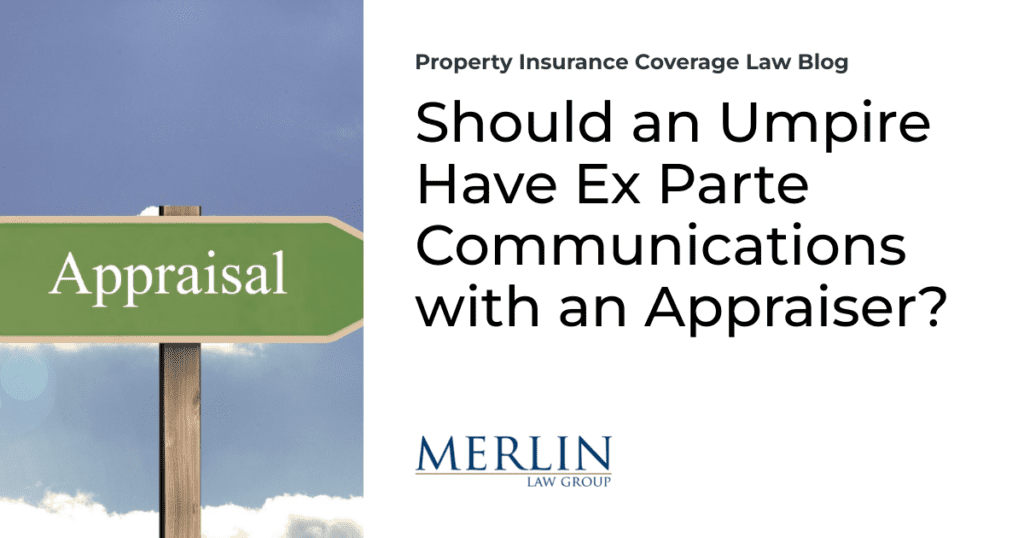Should an Umpire Have Ex Parte Communications with an Appraiser?

The recent post, Should Appraisers be Prevented from Speaking with Parties to the Appraisal? noted Jonathon Held’s 2nd Edition of “The Appraisal Process: An Outline For Making Awards Useful and Final.” The paper promotes the following protocol regarding ex parte communications of an umpire:
Neither the Insurer, the Insured, nor their respective counsel shall have any ex parte communication with the umpire or with the other party’s appraiser. The appraisers shall not have any ex parte communications with the umpire.
The issue concerning umpires contacting other appraisers ex parte must arise in every appraisal. John Robison of The Property Loss Appraisal Network (PLAN) teaches that ex parte communications between umpires and appraisers should, with few exceptions, not occur except when it is strictly administrative.
Yet, one Louisiana case1 has justified ex parte communications:
It further contends that Carpenter relied on O’Leary’s opinions with respect to a number of the determinations in the award and that the final numbers were calculated in person by O’Leary and Carpenter without Provencher’s participation or input. Defendant points out that O’Leary explained Provencher’s absence from the final meeting with Carpenter by noting that ‘[i]n the final deliberations when one appraiser is the apparent heir to victory, those conversations go on all the time between an umpire and an appraiser when they’re trying to finalize an award.’… Defendant contends that this statement is evidence of O’Leary’s partiality.
This evidence does not demonstrate a lack of impartiality on either O’Leary’s or Carpenter’s behalf. Mere agreement between the two is hardly misconduct; in fact, it is the entire purpose of the umpire’s involvement in the process. With respect to Carpenter’s reliance on O’Leary’s figures, the Court finds no evidence of partiality. Carpenter testified that, after reviewing the submissions of both the appraisers, O’Leary’s ‘numbers just made more sense to me than [Jerry Provencher]’s did.’… Nothing in the policy language requires the umpire to conduct a de novo investigation of the damages, and defendant has pointed to no legal authorities to suggest that an umpire’s reliance on one appraiser’s figures is evidence of impropriety.
Defendant’s other suggestion, that Carpenter’s and O’Leary’s failure to include Provencher in the discussions finalizing the award is evidence of collusion or impropriety, similarly lacks merit. The depositions of both Carpenter and O’Leary explain at length why Provencher was not included in the final discussions. At this time, Carpenter had already received and read the reports and rebuttals submitted by both appraisers. When asked repeatedly about Provencher’s absence from the discussion, O’Leary testified that it was clear that Provencher would not agree to the numbers that he and Carpenter were leaning toward, and that including Provencher in the discussion ‘would accomplish nothing.’
In addition, Carpenter testified that, in his view, Provencher had ceased participating in the process. He stated that Provencher had missed deadlines, stopped sending emails, and had nothing else to submit for rebuttal. Id. at 40, 51–52. ‘[Provencher] took himself out of the loop, pretty much. Kept
asking him for any more rebuttals, any more input, and he didn’t have any.’….
Finally, Carpenter gave testimony that, by the time the award was being finalized, Provencher had lost credibility in his eyes and he doubted Provencher’s figures. Carpenter specifically testified that ‘Jerry had made some mistakes and actually lied to me and to Lewis [O’Leary]’ and ‘actually went the opposite way from what his own engineers recommended and kind of lost some of the credibility with me on that.’ ….
In sum, the deposition testimony provides ample, impartial reasons why Provencher was not included in the final discussions. The testimony establishes that O’Leary and Carpenter excluded Provencher not out of partiality, but because they knew that Provencher would not consent to their numbers and because Provencher had no more materials to submit that would have influenced the outcome.
I suggest that the best practice is for umpires to avoid ex parte communications. Perhaps those communications can be justified. But why create a controversy when one can be avoided?
Thought For The Day
I think unconscious bias is one of the hardest things to get at.
—Ruth Bader Ginsburg
1 St. Charles Parish Hospital Service Dist. No. 1 v United Fire & Cas. Co., 681 F.Supp.2d 748 (E.D. La. 2010).




